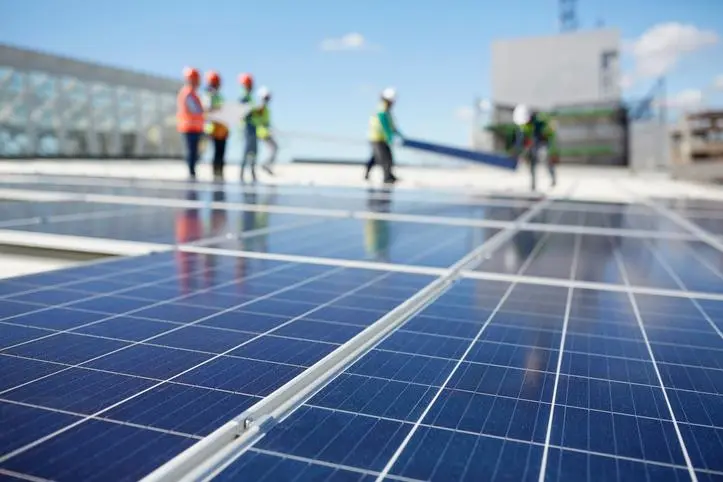PHOTO
BEIRUT: The constant power outage and the sharp shortage of diesel and fuel oil to operate the private generators is definitely a real nightmare for all Lebanese.
But this unpleasant and horrific reality was also a window of opportunity for retail and wholesale solar power system dealers who had seen a remarkable demand from citizens as well as small and medium companies.
We have seen an unbelievable demand for solar panels that comes with batteries in recent few months. Our sales jumped 200 percent this year compared to last year, a representative of a retail solar company told The Daily Star.
She added that most of the clients are outside the capital Beirut and are mainly focused on rural areas and small towns.
Many private generator providers claim that 20 liters of diesel are sold on the black market at LL350,000, prompting many of them to hike the bills on the consumers.
The prices of the solar system with batteries range from $3,000 up to $13,500, depending on the number and size of the batteries and panels.
The companies are offering solar power systems from 5 amps up to 100 amps.
Our phones wont stop ringing. We sometimes get 100 calls a day from citizens who want to inquire about the specifications of the solar system and their prices, another solar power system dealer explained.
The dealers admit that the prices may be too expensive for most Lebanese and what makes matters even worse is that the companies demand fresh dollars for the installation of the systems.
But nevertheless, there are people who are willing to pay any price to guarantee long hours of electricity. They think it is a good investment in the long run because they fear that the electricity outage will get worse in the future, a dealer said.
There are at least over a dozen dealers who are now offering a wide range of solar power systems and batteries in the market.
The batteries can be charged either by the sun or by the electricity from EDL.
We have seven months of sunny weather each year, and even during winter the solar panels and batteries can still be recharged for long hours. Some of the more expensive solar panels and heavy duty batteries can supply close to 20 hours of electricity each day even without the private generators of EDL, one dealer indicated.
The Lebanese Center for Energy Conservation (LCEC) indicated that the aggregate capacity of installed solar photovoltaic (PV) systems in Lebanon reached 78.65 mega-watt-peak (MWp) at the end of 2019, constituting an increase of 39 percent from 56.50 MWp at the end of 2018.
It added that 360 new solar PV projects were implemented in Lebanon in 2019, compared to 326 projects in 2018 and 387 projects in 2017.
It attributed the increase in installed solar PV capacity in Lebanon to the implementation of several projects in 2019 that included installing a solar PV system on the rooftop of the wheat silos at the Port of Beirut, as well as a solar PV system at Casino du Liban. The Energy and Water Ministry implemented the two projects.
On a regional basis, it indicated that Mount Lebanon hosted 35 percent of the country's total solar PV capacity at the end of 2019 as reported by Lebanon This Week, the economic research publication of the Byblos Bank Group, followed by the Bekaa area with 26 percent, south Lebanon and the Baalbeck-Hermel region with 9 percent each, Beirut with 8 percent, north Lebanon and the Nabatieh area with 5 percent each, and Akkar with 3 percent.
On a sectorial basis, it said that the industrial sector accounted for 33 percent of total installed solar PV capacity at the end of 2019, followed by the commercial sector (20 percent ), the residential and agricultural sectors (13 percent each), the public sector (8 percent ), the education and non-profit sectors (5 percent ) and the medical sector (3 percent ).
It noted that the National Renewable Energy Action Plan (NREAP) targets a solar PV capacity of 100 MWp by 2020, which would require an additional 21.35 MWp of installed capacity in 2020.
As such, it considered that funding from the National Energy Efficiency and Renewable Energy Action (NEEREA), which is Banque du Liban's existing financing mechanism for energy efficiency and renewable energy investments, is crucial to reach the target.
It added that the current commitment of international financial institutions, such as the European Bank for Reconstruction and Development, the European Investment Bank and the Agence Franaise de Dveloppement, to provide lending through local banks for sustainable projects in Lebanon, would help achieve this target.
It pointed out that total cumulative investments in the solar PV sector stood at $125.8 million in 2019, up by 20 percent from $105.1 million in 2018, largely supported by the NEEREA loan program, which provided $64.75 million in funding in 2019.
It estimated that decentralized solar PV systems generated 111.7 gigawatt hours (GWh) in 2019 compared to 83.8 GWh in 2018.
As such, it noted that electricity generated through solar PV systems represented 0.73 percent of the power that Elctricit du Liban's generated in 2019, compared to a share of 0.55 percent in 2018.
It added that the NREAP targets a decentralized solar PV generation of 160 GWh per year by 2020, which would have required the generation of an additional 48.29 GWh in 2020.
Copyright 2021, The Daily Star. All rights reserved. Provided by SyndiGate Media Inc. (Syndigate.info).





















